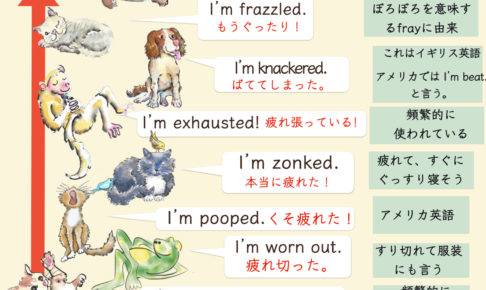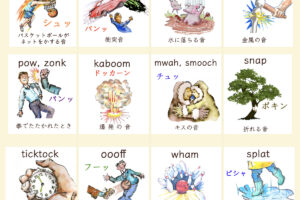日本に住んでいる外国人の友人の中で、日本語学校に通っている人と英会話の仕事をしている人が多いのですが、日本語学校に通っている友人達は結構時間があるようで、旅行をしたり、クラブに行ったり、映画に行ったり、飲みに行ったり、楽しそうなことを頻繁にしています。一方英会話の仕事をしている友人達は、仕事ばかりしています。日本語学校に通っている友人達の方がリア充といった感じでしょう。このような人生は、どのような英語で表せば良いでのしょうか。
Ben is always out with friends. He has an amazing social life.
ベンはいつも友達と一緒に出かけたりしてるよな。あいつは本当にリア充だな。
Stop boasting about your amazing social life.
リア充アピールすんなよ。
また、とても社交的な人は、extrovert や outgoing と呼ばれています。
My mom is so outgoing. She made friends with our neighbors the first day we moved to our new house.
母はとても社交的だ。新しい家に引っ越した日に、近所の人達と仲良くしていた。
充実感や満足感を表すには、fulfilling という形容詞が良いでしょう。
I wish that I had a more fulfilling life!
より充実感のある人生を送りたい!
make the most of は「できるだけ生かす」という意味なので、make the most of your life は「人生を充実させる」になります。
On Saturday morning I did yoga, in the afternoon I had lunch with some friends and in the evening I went to a party.
Wow. You are making the most of your life!
土曜の朝はヨガ、午後は友達とランチ、夜はパーティー行くんだ。
おお、めっちゃ充実してるね!
英語では、live life to the max という砕けたフレーズをよく耳にします。「人生を最大限に生きる」という意味になるので、これもリア充を英語で表現する時に使えそうですね。
I want to live life to the max.
私は人生を充実させたいです。
また、リア充は今を生きている感じがするので、これを表現するには、live in the moment という英語が良いです。
Live in the moment.
今を生きる。













いつも絵が素敵ですね!お父様が描かれているんですよね。
なかなか英会話が上達しません。Lukeさんのとてもわかりやすいですが、なかなか覚えられず悲しいです
Normalfagって日本語のリア充とは違う意味なのですか?
Well yeah “normalfag” could fit here, but IMO that’s too 4chan and not well-used, not to mention super derogatory beyond a little sarcasm and self-deprecation リア充 implies. Just my opinion though.
日本語の「リア充」は人生を楽しんでる人の事ではなくて、恋人関係の相手がいるか又は結婚している人を言う言葉です。充実した生活を送ってても独身なら「リア充」とは言いません。
So true. Honesty and everything redzngioec.
元々はそういった意味合いが強かったですが、現在ではそんなことはないと思いますよ
リア充に関しては現在はLukeさんの例文のような使用例も多くあるので、恋愛関係に限定されるとは一概に言えないと思います
Hi Luke,
I considered the sentence,” I hate going on trains during rush hour.”
It is not ” during THE rush hour. ”
I think the usage is the same as ” By mail”.
◆ during * hour ( s )
For example,
1. during rush hour : Singular
2. during lunch hour: usually Singular
3. during business hours (office hours): Plural = business time
4. during off hours: Plural = off time
Note 1.: ① In many cases, ” Lunch hour ” is a part of ” Off hours ” overseas.
② The time range of Lunch hour is different in each countries.
So,we may not make an apointment during off hours.
Note 2.: Business hours ⇔ Off hours
PS. You put your comment in Japanese that your friend said you have a lot of strange habits of saying in Japanese on this page.
And,you wrote that you didn’t notice that.
I think the friend is your real friend.
” Reajyuu ” at the title on this web page is not even a word.
Frankly,we have never hard it.
And, we feel it so creepy and uncool.
Who is ” we “?
” Real Japanese. ”
If someone say ,” I know the word! It is a Japanese word! “,They are not even Japanese in actually. It is true.
You are not Japanese,too.
And,you love Japan or Japanese,you know?
But,some people are not like you.
And,they speak Japanese,too.
You may believe that they must Japanese.
The answer is ” No. “.
All of wise people know that.
Have a look at one of strange comment on this article.
Someone wrote in Japanese that ” Reajyuu is a Japanese word! It means fulfilment!It means happiness!But,you guys! Never say ,” you are Reajyuu” to every single people even though the person has great life in real!! You must say that ” Only married person is Reajyuu! (,even though the person is awful.)”.
How do you think about it?
If you are a single person,the person said you that ” you must never be fulfilment! “.
Do you understand how crazy the person is?
Where is the right that the person order to you?
Fulfilment is the state of mind and heart.
It’s depends on each person.
Who can decide it?
The ( married?)person who put the strange comment have never been you nor me.
Adittionally,you managed the web site for learning English.
Why someone that don’t learn English put an irrelevant argument only in Japanese on this web site?
I’ve never thought to explain about those people in Japan.
But,I will try to explain that FOR YOU just once.
It’s okey if you don’t believe what I reveal their identity.
・Most of them are members of some kinds of religious cult.
・One of major cult religion designated problematic cult in France in actually.
・Those are not based on Japanese traditional religion,but based on south or north korean cult.
・I don’t know about your religion.Catholic?
Anyway,Don’t close to protestant in Japan.
You don’t know its same place of the church has registered by many other previous cult religions.
・ The problematic cult’s guru book marriage among religious cult-people without their will( if they have own will ).
・ They are communists or socialists in real.
・ Ex- manager of Public Security Investigation Agency in Japan revealed that they are both in rightist and leftist. And,they built up violent organizations.Their front enterprise is including entertainment,media,education,to control dispatchedworkers and other things.
・ It is reported that most of their families have got welfare income by complain about their situations as victims with no reason.
( Many people say ” Metcha ” at their hometown.)
・ It is also reported that ex-prime
minister,Yoshida Shigeru had tried them to enforced repatriation. Because,he knew 100%- criminals were them,but was killed by them.
・Recently,using double name including Japanese name by them was subject to limit.
Therefore,most of them had chose using Japanese name by a particular way.
・They control media and advertisement
agency.So,their manipulation make up which one is real Japanese. Recently,some TV stations have been boycotted by Japanese that knew the truth,so that they are deficits.
・They act in secret as gang stokers. The members act as divided role,a married couple,a usual family,their children,students,a colleague,Industrial Physician,etc.
・Ex- Japanese employee from “Olympus” took them to court as real victim by gang stokers in the enterprise,and won.
I knew the article on the web site by ex-student of Tokyo university unexpectedly.
・Lots of Japanese people reported that they have been targeted by their radio wave attack.
・They cause noise pollution by loudspeaker
noise,construction noise,any kinds of annoying noise using gang stokers.
・In Japanese Parliament,some members of Congress revealed that the members of gang stokers moved in the neighborhood:The member including several young guys as like shadows always surveillant the members of Congress to make trouble for.
・Some ex-government officials,intellectuals,
famous people and others have revealed those things going through web sites,you tube,cable
television,published books nowadays.
・Their patterns to talking to strangers are almost same. For example,I read some comments on the another web site by other European, who speak Japanese well.
It is the same as one of another comment in Japanese on this web page:
” How is your father? Is the picture painted by your father? Oh,it’s nice.Then,to fall in love is not relative to ” Reajyuu”. ( Probably,the person want to say that ” Can you make sure? You must worship what our guru is saying as like us.)
We( true Japanese ) love you Luke.
I think they don’t understand English well.
The strange word,” Reajyuu ” pull them in you.
If you do not use the words any more,they will leave from you.
If you’ll show more another version,It’s ok.
I will stick blindfold seals on some key words.
On this article,your Japanese well without keyword.
To notice sth is not a shame,Luke.
It’s just a path for improvement.
If you live life truely,lefe is never ending improvement.
@★Mika: Your English is horrible..
なぬにたにかなかかなかかなはこななふちまのるぬやにまやか
なけ